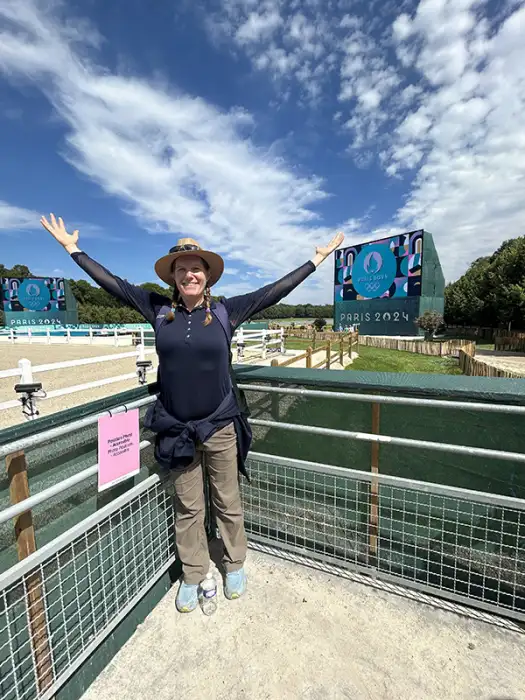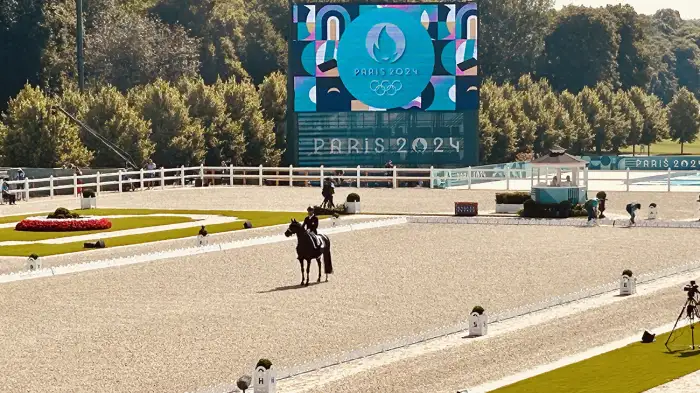Five days; 117,379 steps taken; 47 miles walked. Countless pastries consumed but not enough glasses of wine drunk because almost no alcohol was allowed inside the Palace of Versailles Olympic equestrian venue. I thought I was tired when I worked the press, but it turns out spectating the Olympic Games offers even less time for sleep.
While my too-short time in Paris was a blast, it left me pondering the place and purpose of horse sports in these Games. For almost 20 years, I followed equestrian sport for my career. I could explain the scoring, kept up to date with rule changes, and had, if not always the inside scoop, at least a pretty good idea about how much truth lay behind the most juicy rumors.
But as a spectator at the Olympics, I found myself confused. A lot. My traveling companions and I discussed the curious two-round show jumping format for the eventing individual medals and how exactly the substitution rules worked more times than I care to admit—and that was among a group of people who love eventing so much they go to a five-star or international championship every year just to watch. We went back and forth between Googling start orders and searching for live results—which weren’t available at the venue—and searching various equestrian media sites to figure out what was going on in front of our eyes. (The Chronicle’s “What You Need To Know” guides were clutch here.) Along the way we learned eventing isn’t guaranteed a spot in the 2028 Olympic Games, but if it does take place there, it will almost certainly occur in yet another new format.

The dressage competition also debuted a new method for qualifying for individual medals. The system approximates racing heats, so the best two in each of six athlete groups go forward to the freestyle, as well as six more, rather than just taking the top 18 scores. I believe this is an effort to make the sport a little bit more like track and field or swimming, which is an interesting priority, given that we’re still cantering down centerline dressed for a formal dinner party.
Whenever Fédération Equestre Internationale officials tweak the championship format for an Olympic Games, they do so with the stated intention of keeping equestrian sport in the Olympics. It’s not unreasonable that the International Olympic Committee members ask equestrian to consider how to make hosting horse competition less expensive and more inclusive to nations without a longstanding competitive equestrian tradition. It feels like a new variation debuts at each Games. Some of these changes stick, like eliminating roads, tracks and steeplechase in eventing, while others are never seen again, like completely separating the individual and team competitions.
ADVERTISEMENT
I understand, from a human perspective, why it’s important to keep horse sports in the Olympics. They’re a major goal for the athletes, but even more, the Olympics are one of the best marketing tools for introducing new people to horse sport and growing the support base for expensive sports, the costs of which are soaring ever further into the stratosphere. If riding and training horses is going to continue to exist as a potential career rather than just a hobby for the uber-wealthy, then that support is essential.
And it’s OK that equestrian sport changes. Horses are bred more specifically for certain jobs. Less open land exists. We know more about horse health and happiness now than we did 100 years ago. When we know better, we should do better. Tradition and “we’ve always done it this way” are poor excuses for resisting a change that might lead to healthier, sounder horses. But as we’ve learned once again to our dismay, the real threat to equestrian sport in the Olympics isn’t whether we have enough athletes from different nations or whether the scoring system parallels more popular sports. It’s whether the public believes we’re doing right by our horses.
Because horse sport isn’t like the other Olympic competitions. We’re working in partnership with animals who experience all the discomforts of being an elite athlete without the benefit of understanding the goal their rider is pursuing with such focus. And while I, and most other horse people, would argue that horses choose to participate and actually enjoy competition if they’re successful at that level, it’s still our job to protect our partners as much as possible from the discomforts that come with striving for a pinnacle of athletic achievement.

No inalienable right exists to compete horses at all, let alone for equestrian sport to be part of the Olympic Games. It’s a nice-to-have, not a need. So if the IOC asks equestrian to make changes, we need to make sure those changes benefit the horse, first and foremost. It’s a difficult needle to thread to preserve the essence of the traditional equestrian sports while meeting IOC criteria and still prioritizing horse welfare above all.
You can’t make everybody happy, but I will gladly learn a new scoring format for each Games in exchange for bringing back a team drop score so a rider can more easily pull up mid-course when something feels off rather than pressing on. And if the IOC requires changes that go against horse welfare? Then equestrian sport must draw a line and choose the health and safety of these amazing, generous animals over the benefit of competing in the Olympics.
Sara Lieser grew up in Maine and learned about eventing through the U.S. Pony Clubs. She worked in professional barns before, during and after college and eventually landed an internship at the Chronicle, where she stayed for the next 17 years, working her way up to managing editor while competing to the intermediate level. Sara and her husband Eric own a small farm in Virginia and have two children and an evolving cast of animals. Sara left the Chronicle to pursue a master’s degree in social work and is currently on break from competing while she figures out her next career steps.














